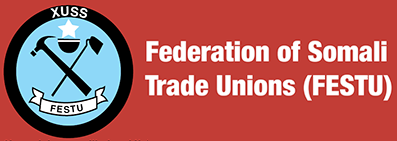March 8, 2023: The Federation of Somali Trade Unions (FESTU) salutes all working women in our country and around the world on their significant day, the International Women’s Day which emerged from the struggles of working women who experienced challenges of poor working conditions, unequal pay, unpaid care work, and most of the jobs were reserved for men.
On this day, when we remember their sacrifices, we must rekindle our commitment towards the total emancipation of women. The challenges facing women in Somalia today are daunting. Somali society remains one of the most unequal in the world, while the scourge of women oppression and demon of patriarchy are yet to be conquered within our communities.
In our country, we still witness the situation, where access to basic services is still skewed in gender and geographic terms. Women continue to be the face of poverty, especially working class women. Socio-economic conditions and patriarchal attitudes that justify and perpetuate abuse of women are driving the staggeringly high rates of working poverty in almost every region of the country.
Whilst Somali society battles with many socio-economic difficulties, Somali women and girls are subject to horrific levels of gender-based violence and harassment, often in the hands of those who are expected to care for and protect them.
Women remain responsible for the bulk of unpaid care work. This includes all of the work that contributes to reproducing society, such as childbearing, child rearing and domestic chores; which is invisible, not paid, not supported and unrecognized. A key aspect of the struggle for gender equality is that care work should become a societal responsibility.
Somali women tend to occupy the most vulnerable, lowest status and lowest paid occupations. While some vulnerable women workers may have their own associations, many remain unorganised and are often then not unable to defend their rights.
If we are to achieve the goal of gender parity, we all need to step up and play our individual and collective roles and responsibilities. We need a huge cultural and mindset change if we are to ensure that our commitments become a reality. Organized labour needs to take urgent action and FESTU has already committed itself to the strategic objective of organising vulnerable sectors and vulnerable layers of workers, which are predominantly women.
The Federation is reiterating its call to its affiliates to pay special attention to women workers that are in vulnerable and unsafe work, which is not always protected by law, and where enforcement is weak. These include domestic workers, farm workers, workers in the informal economy, casual workers, etc.
FESTU shall continue to campaign for the domestication and effective implementation of ILO convention 190 on violence and harassment at the world of work and will take up workplace struggles to ensure that workers, including women workers, have the right to stable and decent employment opportunities. Women have a right to a living wage and access to basic services. They have a right to access education, training, decent working hours and equal opportunities.
FESTU and affiliated unions use this opportunity to recommit fighting for the elimination of gender discrimination, sexual harassment, violence, abuse, poverty and inequality at workplaces and in our communities.
ISSUED BY:
Omar Faruk Osman |General Secretary |Federation of Somali Trade Unions (FESTU)
